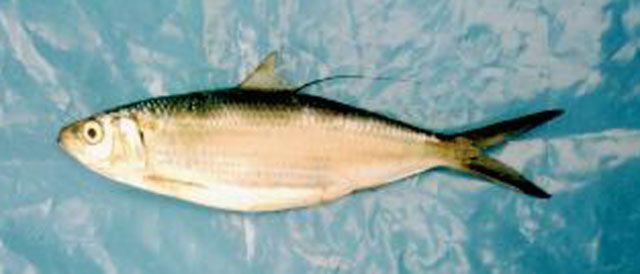| Clupeidae (Herrings, shads, sardines, menhadens), subfamily: Dorosomatinae |
| 30 cm TL (male/unsexed) |
|
pelagic-neritic; depth range - 70 m |
| Eastern Pacific: Santa Rosalita, Pacific coast of Baja, California, Mexico southward to Punta Sal and Punta Picos, Peru. (Earlier works probably combined data for Opisthonema bulleri and Opisthonema medirastre). Range is extended northwards to San Pedro, California (Ref. 35601). Rare on outer coast of Baja California Sur (Ref. 35601). |
|
Dorsal spines (total): 0-0; Dorsal soft rays (total): 13-21; Anal spines: 0-0; Anal soft rays: 12-23. The filamentous last dorsal fin ray distinguishes it from members of any other eastern Pacific clupeoid genus. Separated from eastern Pacific Opisthonema species by having 63 to 110 lower gill rakers in fishes over 14 cm standard length. |
| Usually occur near the surface of coastal and offshore waters, down to over bottom of continental shelf (Ref. 11035). Form dense schools. Apparently the most abundant of the eastern Pacific species of Opisthonema. Feed on phytoplankton (dinoflagellates and diatoms). Oviparous, with planktonic eggs and larvae (Ref. 35601). It is reduced to fish meal (Ref. 9291). Oil may be extracted (Ref. 9291). May be canned (Ref. 9291). |
|
(Ref. 96402)
|
| harmless |
|
Source and more info: www.fishbase.org. For personal, classroom, and other internal use only. Not for publication.
Page created by Jen, 05.08.02,
php script by kbanasihan 06/09/2010 ,
last modified by
dsantos, 20/08/10

